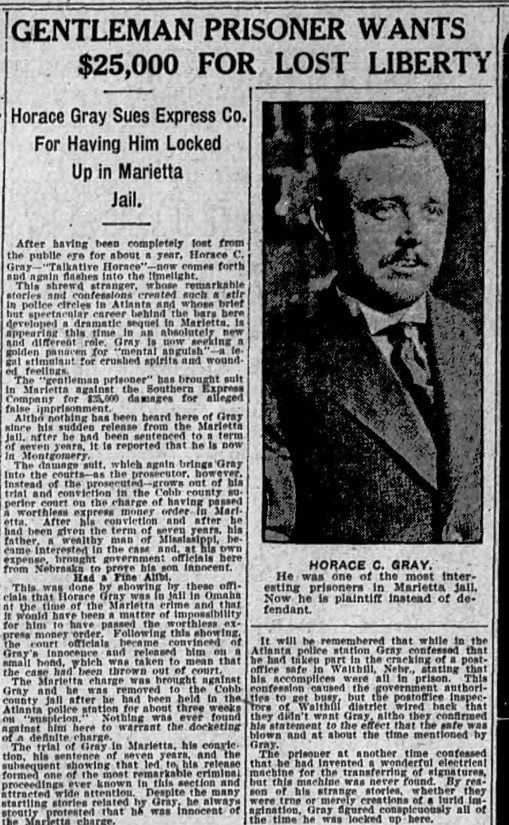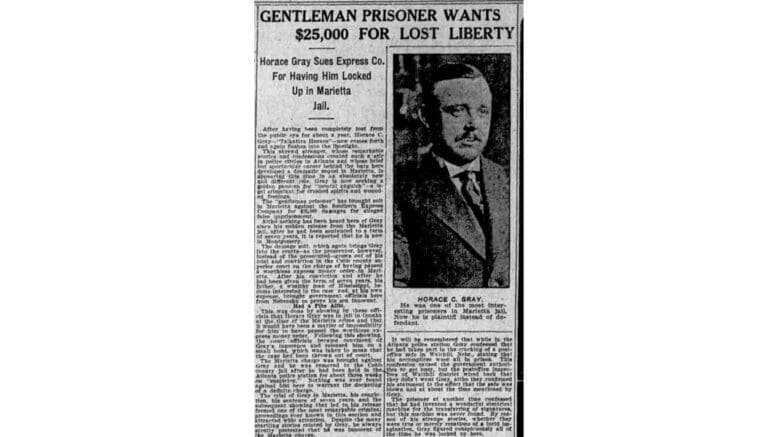Flim flam artists have fascinated the public, at least since their exploits were featured, in sometimes exaggerated ways, by pulp fiction writers and tabloid journalists in the late 19th and early 20th centuries.
Today, I found the story of a forger arrested and released in Marietta.
As editor and publisher of the Cobb County Courier, I often read through old newspapers on the Georgia Historic Newspapers site at UGA (see the section at the bottom of the article to learn more about that wonderful database). I visit it to find material for history features and human interest filler stories.
One particularly good source of quirky and interesting stories from the early 20th Century is the Atlanta Georgian, owned by William Randolph Hearst for part of its existence.
The Georgian had a knack for picking up weird little stories that would today be called “clickbait.”
The story below, an excerpt from the May 24, 1910 issue, is about Horace C. Gray, a flamboyant forger and con artist, who made outlandish confessions to the Atlanta police, where he was in custody before his trial in Marietta.
GENTLEMAN PRISONER WANTS $25,000 FOR LOST LIBERTY
Horace Gray Sues Express Co. For Having Him Locked Up in Marietta Jail.
After having been completely lost from the public eye for about a year, Horace C. Gray—”Talkative Horace”—now comes forth and again flashes into the limelight.
This shrewd stranger, whose remarkable stories and confessions created such a stir in police circles in Atlanta and who was here so spectacularly arrested in July last, has now developed a dramatic sequel in Marietta, appearing this time in an absolutely new and different role. Gray is now seeking a golden panecem for mental anguish – a legal stimulant for crushed spirits and wounded feelings.
The gentleman prisoner has brought suit in Marietta against the Southern Express Company for $25,000 damages for alleged false imprisonment.
After nothing has been heard here of Gray since his sudden release from the Marietta jail, where he had been sentenced to a term of seven years, it is reported that he is now in Montgomery.
The damage suit, which again brings Gray into the courts, as the prosecutor however instead of the prosecuted, grows out of his trial and conviction in the Cobb county superior court on the charge of having passed a worthless express money order in Marietta.
After his conviction and after he had been given the term of seven years, his father, a wealthy man of Mississipi, became interested in the case and, at his own expense, brought government officials here from Nebraska to prove his son innocent.
After hearing this new evidence, the court ordered him released.
The new evidence showed that Gray was in jail in Omaha, Nebraska when the forged money orders were allegedly passed.
The article goes on to describe a series of outrageous confessions Gray had made to Atlanta police before his arrest in Marietta. He confessed to a robbery in Nebraska that officials in that state doubted he was involved in, and Gray told Atlanta police that he had created an electrical device to forge signatures, but no such device was found by police.
Here’s an image of the entire article as it appeared in the original newspaper.

About Georgia Historic Newspapers
Georgia Historic Newspapers is a part of the GALILEO project and is housed at the University of Georgia. It’s an amazing resource for anyone with an interest in the history of Georgia and its regions.
According to the “About” page on its website:
The Georgia Historic Newspapers Archive is a project of the Digital Library of Georgia (DLG), a part of Georgia’s Virtual Library GALILEO and is based at the University of Georgia Libraries. Since 2007, the DLG has partnered with universities, archives, public libraries, historical societies, museums, and other cultural heritage institutions to digitize historical newspapers from around the state. The archive is free and open for public use and includes over two million Georgia newspaper pages between 1763 and 2021.
Newspaper titles are regularly digitized and added to the archive. If you are interested in including a particular title, you can visit our participation page. A majority of the newspapers on this site were digitized from the microfilm produced by the Georgia Newspaper Project (GNP). For more information about the microfilm available through the GNP, please visit their website.
